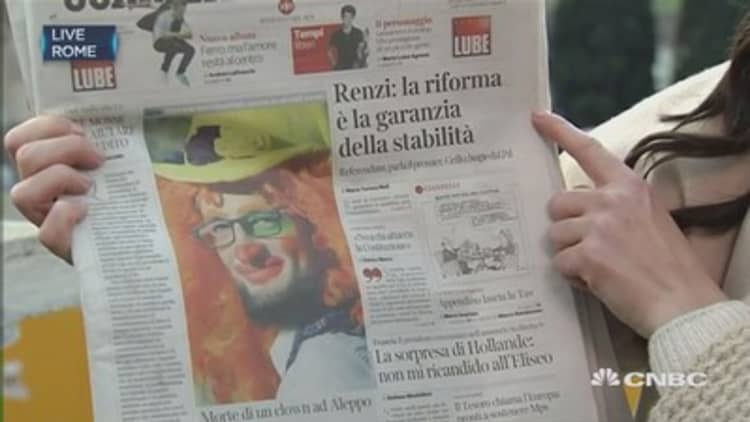Dovish words from the European Central Bank (ECB) this week have fueled speculation of more accommodative monetary policy if Italians reject constitutional reforms this weekend, but one economist has told CNBC that it might not be that simple.
"The market believes that we are basically in for QE (quantitative easing) infinity in Europe and that might be a stretch of the imagination," said Elga Bartsch, Morgan Stanley's global co-head of economics.
While the Morgan Stanley economist acknowledged the rhetoric emanating from ECB President Mario Draghi this week arguably did imply there could be a so-called "Draghi put" in the case of a "no"vote in the referendum, she also posited that this view was somewhat simplistic.
"There was strong communication from him (Draghi) and a number of executive board members at the ECB, but at the same time, the views of the broader council and among the national central bank governors seem to be a little bit more mixed," she explained.
"For instance, the debate as to whether instead of extending by six months at 80 billion (euros), just to do nine months of 60 billion (euros) doesn't really want to go away," Bartsch noted.
A ‘Draghi put’?
The expectation of a "Draghi put" – in other words, the ECB stepping into counter market volatility in the aftermath of a potential "no" vote in the Italian referendum by unveiling further monetary easing measures – rose following a speech by the president on Wednesday in which he said the bank will look at a combination of policy tools at its next meeting on December 8.
Indeed a majority of economists polled by Reuters in data released Friday morning said they expected to see a six-month extension to the ECB's QE program announced next week with the size of the central bank's monthly asset purchases left unchanged.
However, Bartsch argues that the market is unlikely to move dramatically in the case of the "no" camp coming out ahead in the referendum as that is currently widely regarded as the most likely outcome.
In her words, "The bad news is already baked into most people's macroeconomic baselines including ours."
Yet, while the economist believes the market may have already adjusted for Italy's upcoming referendum, she is less sanguine about its preparedness for the complete series of upcoming political events – the referendum plus next year's French presidential election and German general election – which she refers to as a"political triple jump".
Describing the combination of these events as a "big risk", Bartsch says she anticipates further disruption as they play out.
"I don't think we have seen peak protests yet and globalization potentially is at risk and I think that could potentially be very negative for productivity trends and businesses globally," she warned.
Banking risks

Meanwhile, the risks to the beleaguered Italian banking sector in the case of a "no" vote were highlighted on Thursday by both the country's economy minister and credit rating agency DBRS.
Italy's Economy Minister Pier Carlo Padoan told state broadcaster RAI that while the country's banking industry was "solid", eight lenders remain in a delicate position. Among those, he warned that (BMPS) – which is looking to raise 5 billion euros ($5.3 billion) before year end in order to fill a capital shortfall – will face more of a challenge to do so if the referendum is voted down.
This as DBRS said a "yes" vote in the referendum would hand Prime Minister Matteo Renzi an effective mandate to continue with his economic reform agenda and would be the best outcome for Italy from a credit perspective.
Indeed, DBRS's Co-Head of Sovereign Ratings, Fergus McCormick, spelled out to Reuters the potentially dangerous implications of the alternative scenario.
"If the referendum is defeated by a very wide margin, and then snap elections are called, this raises the political uncertainty...we are concerned about investor sentiment in this environment," he cautioned.


